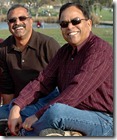 Amita (11 years old): The two best years of my life where when I was the only child. After my brother came along, he got everything his way. (looking mischievously at him) But I guess I’ll keep him around. He does tell pretty good jokes.
Amita (11 years old): The two best years of my life where when I was the only child. After my brother came along, he got everything his way. (looking mischievously at him) But I guess I’ll keep him around. He does tell pretty good jokes.
Nishant (7 years old): My parents just brought my sister from the hospital 2 days ago. She’s boring. All she does is cry, eat and poop.
Sandeep (58 years old): Manoj and I used to fight all the time. We loved to wrestle. I think my mom aged about 10 years every time she saw us going at it, worried we’d get hurt. It’s how we bonded. We loved it.
Shalini (72 years old): Rekha and I would argue all the time. If I wanted one type of music, she wanted another. We’d steal each other’s clothes and even each other’s journals and pencil boxes. We fought all the time. But we always loved each other and stood up for each other. I truly miss her.
Natasha (25 years old): Having a twin is like having a built in best friend. Growing up we shared everything and I always knew Meena had my back no matter what.
Mehnaaz (4 years old): I like Ali because he gives me candy when Abbu says no.
Growing up with a sibling can be a very special experience. From a young age, people with siblings have a built in friend and psychologists say that your first socialization experience, such as learning how to negotiate, compromise and share occurs with your sibling before with anyone else. While parents experience increased stress watching siblings fight, an inevitable side effect of having more than one child, more and more research is pointing to the protective factors of a sibling relationship on mental health issues for children.
Results of a study conducted at Brigham Young University with almost 400 families was published in 2010 to identify the positive role of siblings on children. Specifically, they were looking at young adolescents between the age of 10 and 14 years, a time of life when the rate depression, anxiety and many other mental health diagnoses rises sharply for children. So each of the families in the study had at least 1 child within that age range.
Their analyses showed that having a sister protected the young adolescents from feeling lonely, unloved, guilty, self-conscious or fearful. Regardless of sibling order or the age difference between the adolescent and the sister, it seems that having a sister protects against some of the common symptoms of depression and anxiety. It’s possible because girls are raised to be more emotional and socially connected than boys, they promote a closer emotional bond in their siblings.
 In addition, they found that having brothers did not have the same effect on depression and anxiety but did affect how helpful or altruistic the young adolescent was. Again, regardless of whether the brother was older or younger or how far apart the siblings were age-wise, sibling affection and good deeds were two times more closely connected than parental affection and good deeds.
In addition, they found that having brothers did not have the same effect on depression and anxiety but did affect how helpful or altruistic the young adolescent was. Again, regardless of whether the brother was older or younger or how far apart the siblings were age-wise, sibling affection and good deeds were two times more closely connected than parental affection and good deeds.
In general, even if siblings fight, if there is affection in the relationship, says Professor Laura Padilla-Walker, it protects against delinquency and increases generosity and kindness toward others. A loving sibling relationship is more likely to predict these results, according to their study, than a loving parent-child relationship, speaking to the unique bond that siblings share. Researchers caution, though, that hostility in the sibling relationship is a predictor of greater delinquency and isolation in the future.
However, fighting amongst siblings without hostility, while it might be frustrating or annoying for parents to hear constantly, is not a bad thing. In fact, being allowed to fight, make up and maintain a strong relationship helps the children learn how to regain control of their emotions and deal with difficult situations better. These skills are essential for maintaining positive mental health as adolescents and adults.
“An absence of affection seems to be a bigger problem than high levels of conflict,” Padilla-Walker says.
Do you have a sibling? What was your experience like growing up with them? We would love to hear your thoughts! Please leave your comments below.
